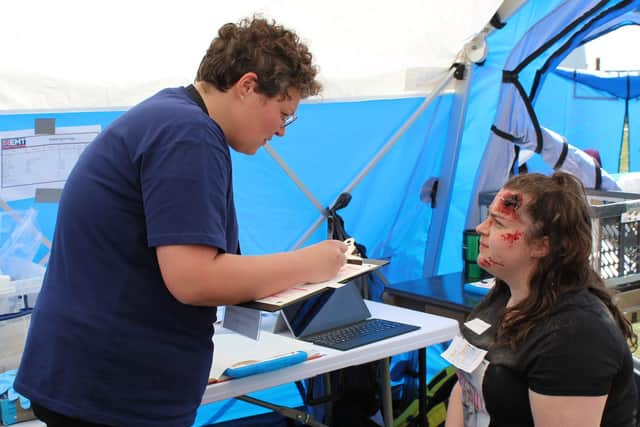Working in disaster zones helped Leighton Buzzard nurse in battle against Covid
and live on Freeview channel 276
A Leighton Buzzard nurse has found dealing with deadly diseases in West Africa, Bangladesh and Cambodia has helped her fight Covid-19 back home.
Harriet Walton has fought Ebola, diphtheria and Covid-19 in Cambodia and Lebanon before returning home during the pandemic.
Advertisement
Hide AdAdvertisement
Hide AdAnd she has managed to use her skills, gained while working with the emergency health charity UK-Med to support colleagues not used to working with infectious diseases.


Harriet, an accident and emergency nurse at University College London Hospitals NHS Foundation Trust (UCLH), spent four months working with the charity.
She said: “Having worked in an Ebola Treatment Centre in Sierra Leone I’d received multiple trainings in how to use PPE, so I never felt anxious about treating a Covid patient. People were very worried about how to protect themselves. I was able to support my colleagues who hadn’t worked with such an infectious disease before. I knew that if we could keep ourselves safe, we could keep our patients safe.
“Nursing is about adaptability. You have to nurse every patient in a different way. Working in different cultures, with different languages teaches you how to adapt to deliver the best care you can for that patient. I think with Covid and people not being able to see their relatives, I really drew from my experience to make sure I was keeping patients calm and informed about what was going on and little things like showing them my face from the other side of the glass when I could - so they knew I was a person underneath all that PPE.”
Advertisement
Hide AdAdvertisement
Hide AdHarriet, who worked in a specialist infectious disease hospital says her experience has been invaluable, enabling her to treat and assess diseases many people in the UK haven’t seen.
She recalls: “There was a patient who came into our department after I’d got back from Bangladesh with a letter from the doctor to say he had suspected diphtheria. I was able to say: ‘Don’t worry. I’ve done this already. And I knew how to approach the situation.”
Harriet has spent four months with charity UK-Med and as part of the government’s UK Emergency Medical Team in Sierra Leone, Cox’s Bazar - Bangladesh, Cambodia and in Lebanon, following the devastating blast at Beirut Port in August 2021, which killed hundreds and unleashed a deadly Covid-19 wave.
Her comments come as a new report is released by frontline medical aid charity UK-Med, which highlights how doctors and nurses who’ve returned from disaster zones bring vital skills and experience back to the NHS.
Advertisement
Hide AdAdvertisement
Hide AdUK-Med is a Manchester-based frontline medical aid charity with 30 years’ experience responding to health emergencies around the world. It is a partner in the UK Emergency Medical Team (UK EMT) – the government’s front-line response to a humanitarian crisis overseas.